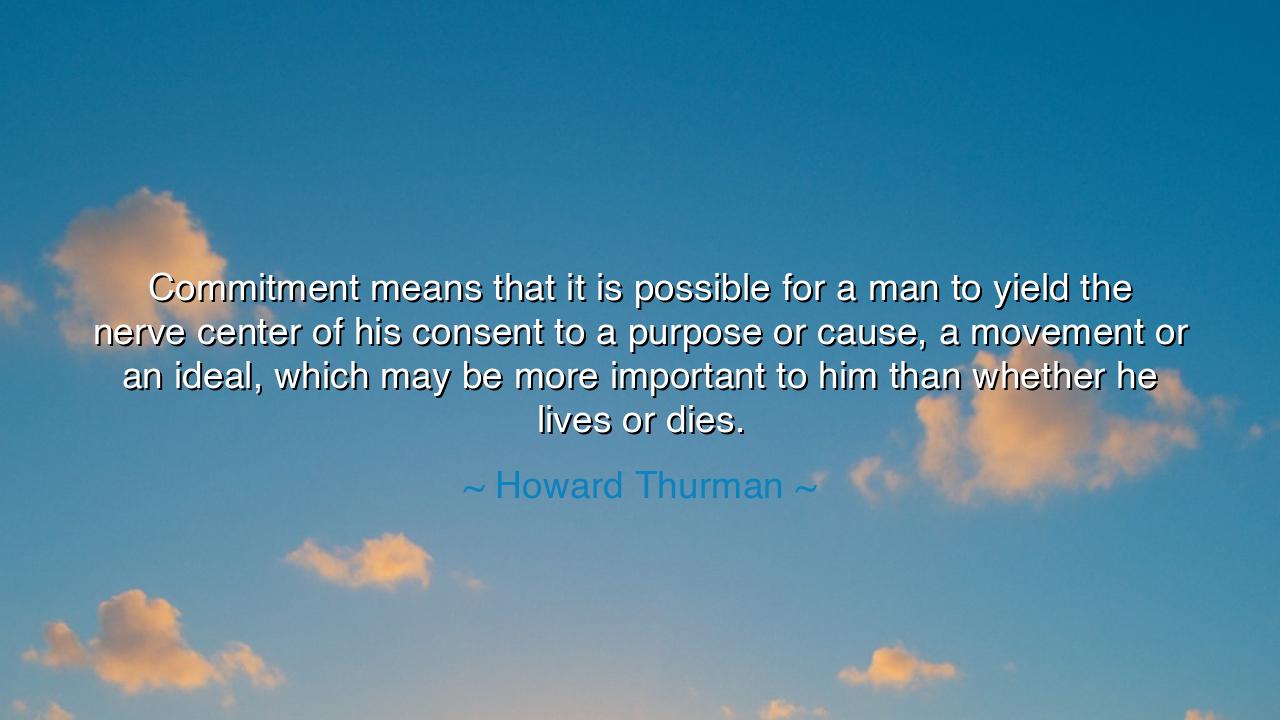
Commitment means that it is possible for a man to yield the nerve
Commitment means that it is possible for a man to yield the nerve center of his consent to a purpose or cause, a movement or an ideal, which may be more important to him than whether he lives or dies.






When Howard Thurman declared, “Commitment means that it is possible for a man to yield the nerve center of his consent to a purpose or cause, a movement or an ideal, which may be more important to him than whether he lives or dies,” he spoke with the voice of profound moral and spiritual insight. Thurman, a theologian, philosopher, and civil rights thinker, understood that true commitment is not a casual pledge, but a surrender of the self to a higher principle. It is the willingness to place one’s heart, mind, and very existence in service of something transcendent — something so meaningful that life itself becomes secondary to its realization.
The ancients would have recognized this truth immediately. Socrates, in drinking the hemlock, yielded his life to the pursuit of truth, showing that allegiance to principle can surpass the instinct for self-preservation. Similarly, Plato’s heroes and Roman martyrs acted not for personal gain, but for ideals larger than themselves. Thurman’s insight captures this same essence: commitment demands that a man align his will with something greater, relinquishing personal security for the sake of enduring purpose. To commit fully is to live in a moral orbit that eclipses mere survival.
Thurman’s words also illuminate the difference between superficial promises and true allegiance. Many may declare loyalty to causes, yet falter when danger arises or when personal comfort is threatened. Real commitment is forged in the crucible of challenge. It is when the nerve center of consent — the deepest part of one’s being — is willingly given to an ideal that the human spirit achieves its highest expression. Commitment is not measured by words alone, but by the courage to endure, sacrifice, and act, even when the cost is life itself.
History is rich with examples of such unwavering commitment. Consider Martin Luther King Jr., who dedicated his life to justice and equality, knowing that his pursuit might bring imprisonment or death. King’s consent was not given lightly; it was a deliberate surrender to the principle of nonviolent resistance and human dignity. He made the cause of civil rights so central to his being that his own safety became secondary. Thurman, a mentor and spiritual guide to King, likely witnessed firsthand what it means for a man to yield his inner life to a purpose greater than himself.
This notion of yielding oneself fully also echoes in the stories of the revolutionaries and visionaries of the past. Joan of Arc, believing her mission divinely inspired, risked and ultimately lost her life to a cause she deemed higher than her own existence. Her commitment transcended fear; it was a fusion of courage, faith, and clarity of purpose. Thurman’s insight reminds us that such acts, though rare, illuminate the heights to which the human spirit can rise when it consents fully to an ideal.
Yet commitment, as Thurman articulates, is not merely heroism in extraordinary circumstances. It is a principle that applies in everyday life. A teacher nurturing young minds, a physician serving the sick, or a parent sacrificing for the well-being of a child — all can exhibit this profound alignment of will and purpose. The power of commitment transforms ordinary acts into sacred expressions of dedication, revealing that greatness is not only the domain of historic figures, but also of those who live with deliberate intention every day.
The lesson is both sobering and inspiring: to live fully, one must choose a cause, a purpose, or an ideal that transcends personal desire, and surrender oneself to it with unwavering dedication. To commit in this way is to embrace courage, focus, and resilience, to act not for fleeting gain, but for enduring significance. Thurman teaches that the soul finds its deepest fulfillment not in safety or comfort, but in the alignment of one’s being with what truly matters.
So, O seeker of wisdom, remember Thurman’s guidance: find that which is worth your life, your energy, your very consent, and devote yourself to it as fully as possible. Let your actions reflect that inner surrender, and let your courage be measured by your willingness to place purpose above self. In doing so, you achieve not only influence in the world, but the profound magnificence of a soul fully committed to what is greater than mere existence.






AAdministratorAdministrator
Welcome, honored guests. Please leave a comment, we will respond soon